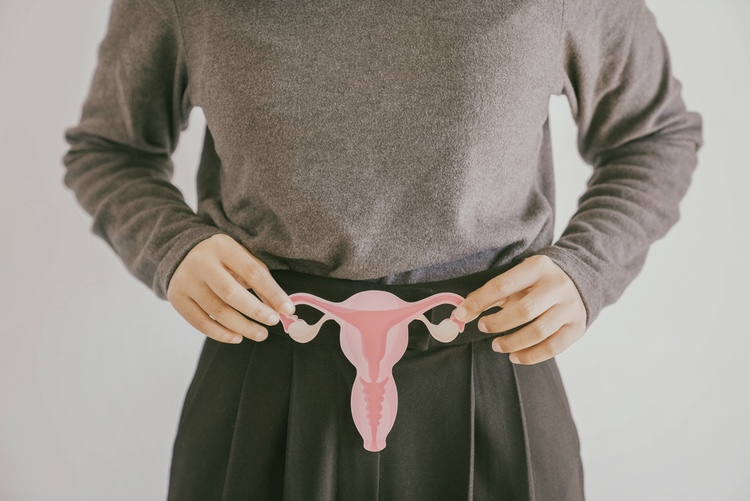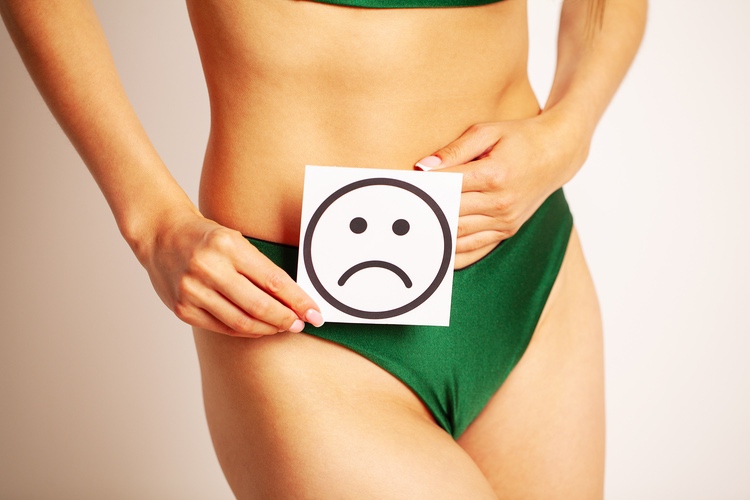
If you want to avoid yeast infections, minimize PMS symptoms and maintain great gynecological health, ChefV.com founder and nutritional therapist Veronica Wheat has some sage advice.
Weight. Gut health. Digestion. Elimination.
These are the things we most often think about when it comes to our food choices. But ladies, when it comes to our overall diet, we should also keep our vaginal microbiome and menstrual cycle in mind.
You see, we not only have an invisible world of trillions of bacteria in our large intestine, comprising most of the Gut microbiome. Women also have a vaginal microbiome. In fact, a study of 110 women of reproductive age revealed that the vagina contains anywhere from 10 billion to 100 billion bacteria.
And just like the gut microbiome, the vaginal microbiome is home to mostly friendly bacteria. But poor food choices and other factors I’ll highlight below can throw off the balance quickly, leading to yeast infections and irregular or painful cycles.
Similar to the relationship in the gut microbiome, in the vaginal microbiome, there’s a symbiotic relationship between the host (you) and the bacteria. Us ladies provide a humid, nutritious and warm environment for the microbes. And in return, what do we get?
In exchange for being able to live rent-free in our warm and cozy ‘ginas, the microbes provide “a first line of defense against nonindigenous microorganisms.” In other words, the friendly vaginal bacteria act like an army and immune system, protecting us from pathogenic invaders that don’t belong down there.

Causes of Vaginal Dysbiosis
But just as a neglected house attracts nasty critters, the internal environment of the vagina can result in vaginal dysbiosis; the unfriendly bacteria take over and wreak havoc.
Out of all the factors that can cause vaginal dysbiosis, I’ll focus mostly on diet. But before I do, I just want to mention other internal and external factors that can disrupt the vaginal microbiome.
- Hormone imbalance: Changes in estrogen and/or progesterone levels, that occur because of pregnancy, breastfeeding, and menopause can alter the vaginal pH and increase the likelihood of infections.
- Contraceptives: This is related to hormone imbalance
- Immune system weakness
- Heavy antibiotic usage
- Sexually-transmitted infections
It’s important to maintain a healthy ecosystem in the vagina because dysbiosis can lead to, among other things:
- Bacterial vaginosis
- Candidiasis (a yeast infection caused by an overgrowth of Candida albicans)
- Adverse pregnancy outcomes
- Human immunodeficiency virus (HIV)
- Human papillomavirus (HPV)
- Pelvic inflammatory disease (PID).

Maintain Optimal Gynecological Health By Going Green
In addition to hygiene, regular exercise, managing stress, and eating a healthy diet are key to maintaining an optimal vaginal pH and microbiome. And for this article, I’m going to focus on nutrition.
People assume I’m the equivalent of a Catholic nun when it comes to nutrition. But I’m not always strict. Sometimes, I “take the habit off” and indulge in my favorite junk food habit: french fries. But the most important lesson I can impart is to eat super healthy like 85% of the time. If you do this, you’ll most likely provide your vaginal microbiome with a healthy environment to thrive in, and you’ll be less likely to experience yeast infections or a difficult menstrual cycle.
Am I just saying this because I’m in the business of delivering Organic Green Drinks to people’s homes across the country (the Green Drink Plan)? Well, yeah!
But low-sugar green leafy veggies (7 of them in Green Drink, all certified USDA Organic!) are clinically proven to support health in many ways.
In fact, Chef V’s 21-Day Detox and Green Drink was the focus of an independent research study. However, one health metric that wasn’t analyzed by Citrus Labs, the Santa Monica research company that conducted the analysis was vaginal health.
So I dug up some research of my own and here’s a couple of examples of how consuming green veggies can support a healthy vaginal microbiome.
What The Research Says About Vaginal Health & Diet
A study published in BMC Women’s Health says dysmenorrhea (painful menstruation with abdominal cramps) is one of the most prevalent gynecological disorders, experienced by approximately 60%-70% of young women during menstruation.
The biological reason why painful periods occur is the increased release of something called prostaglandins into the uterine tissue once menstruation begins. Your body makes prostaglandins (which are hormone-like lipids) at sites of tissue damage or infection.
When high levels of prostaglandins respond to tissue damage, the blood vessels constrict. In addition, you also get more contractions of the muscular layer of the uterus (the myometrium). But the fun is only just beginning. What also ends up happening is blood flow to the uterus is choked off, causing pain.

HEALTHY EATING RESOURCES
CHEF V’s COOKING SCHOOL (Free videos)
What Do I Eat Today? (Free recipes)
Making Cleansing Easier (Free e-cookbook)

Is this simply a physiological curse of being female?
Well, yes, if you indulge in “sugars, salty snacks, sweets and desserts, tea and coffee, salt, fruit juices and added fat (labeled as “snacks” pattern),” according to the research study in BMC Women’s Health.
So how protective are green leafy veggies for gynecological health? Well, a 2017 observational study in the British Journal of Cancer said that “a higher intake of green leafy vegetables was inversely associated with mortality from ovarian cancer.” Because it was an observational study, we can’t conclude that there is direct causation, but the correlation is very strong.

“Just finished my 3 day cleanse & I’m about to start my post cleanse. It was so much easier than I expected. I wasn’t hungry until the end of day 3 & the cleanse was actually very tasty. I lost 5.1 pounds & I feel great. I’m expecting to gain some of that weight back when I start eating solid foods again today but it’s a great kick start & great motivator to continue to eat healthy. Thanks Chef V!" – Sally

Why Do Green Leafy Veggies Support Vaginal Health?
Green leafies like kale, collard greens, lettuce, parsley, and chard (all of which are in Organic Green Drink) contain antioxidants that protect cells from oxidative stress, which prevents cellular damage. These nutrient-dense veggies also keep inflammation in check, which plays a big role in hormone balance.
In addition, green, leafy vegetables contain phytoestrogens. These plant compounds mimic the action of estrogen in the body. If your estrogen levels are low because of perimenopause or menopause, consuming more green leafy veggies may help balance your hormones, which leads to a healthier vaginal microbiome.
And let’s not forget how important it is to eat healthy while pregnant! As a new mom, I’m living proof! No gestational diabetes for me, thank you. You see, green leafies are abundant in essential vitamins and minerals for healthy fetal development. And after your baby is born and you’re back to having periods, the vitamin K in green leafies helps prevent excessive bleeding and encourages healthy blood clotting.

How To Get More Leafy Greens In Your Diet For Vaginal Health
Look, I could go on and on about the benefits of green leafies, but I think by now you get the idea. They’re not just important for maintaining a healthy weight and managing blood sugar. Green leafies are absolutely necessary for an optimal vaginal microbiome!
So here’s how you can incorporate more of them into your diet:
- Salads – Chef V Salads Recipes
- Stir frys
- Sauté or steam (add healthy fats like almond slices and avocado/olive oil)
- Frozen (I’m not a huge fan of frozen but if organic, they are convenient and just as nutritious as fresh veggies.)
- CSA: Get your organic fresh veggies from a Community Supported Agriculture (CSA) program.
- Drink organic green leafy veggies, cold-blended and raw
Check out my entree recipes from my cookbook here.
And don’t forget to minimize your intake of added sugars. Your vaginal microbiome will thank you for it.
To your (vaginal) health!
Love,
Veronica “V” Wheat
Founder, ChefV.com

